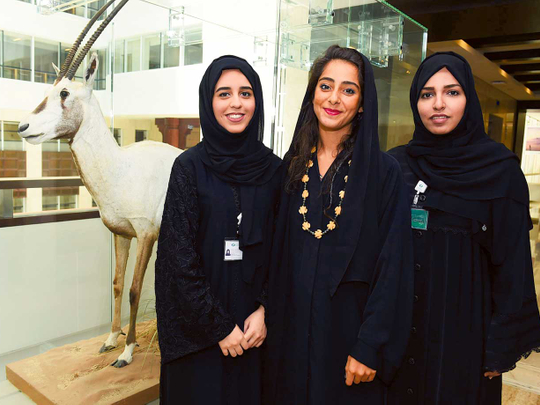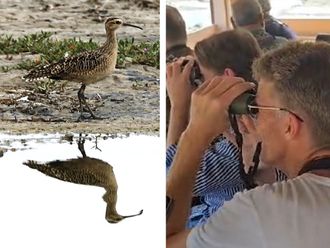
Abu Dhabi: Central to the protection of the UAE’s environment are its women working at the Environment Agency – Abu Dhabi (EAD), who are playing a key role in shaping the country’s policies and research in the field.
As the UAE celebrates Emirati Women’s Day — a day that honours and recognises the hard work put in by Emirati women for the progress of their country, the women at the EAD said that they were proof of the fact that Emirati women are capable of doing whatever they set their minds to.
Maitha Al Hameli, who works as a specialist in marine-threatened species and habitats for the EAD, said that she was following her passion in what she does in a professional capacity.
“Marine life is something that I am very interested in, I believe it is important to protect and look after our marine environment because it has been sustaining the UAE even before the oil, and so now it is my job to ensure its well-being,” she said.
As part of her work, Al Hameli often has to venture into the field, which, in her case, means diving to the bottom of the sea.
“If I am surveying or studying corals and sea grass, I will have to scuba dive. For other surveys on dolphins and dugongs, I will sometimes be on a boat or in a helicopter surveying from above,” she said.
“When I get to go out and see the nature for itself, this motivates me even more to do my work — which I feel very proud to do as an Emirati citizen because, at the end of the day, I am trying to protect our country’s seas,” she added.
Mariam Al Qasimi, who works as a specialist in communications for the EAD, said that her task involves visiting schools as part of the Roots and Shoots programme, which encourages young people to develop their own ideas on protecting the environment.
“I visit schools in Abu Dhabi to engage with the young students on environmental programmes that link humans and animals in a positive way. The programmes we run with the schools include teaching necessary leadership skills for the students so that they are able to take on projects that can go on to become successful.
“My goal is to see more schools sign up for the programme so that we can encourage the youth to be more active in this area, and to educate them about the beauty of nature and how they can help protect it,” she added.
Al Qasimi, who also has a master’s degree in gender studies from the United Kingdom, said that promotion of both genders goes hand in hand with having women working in an official capacity for the protection of the environment.
“I have received a lot of support and encouragement for the work I do, and this gives me the opportunity to represent the agency on an international level,” she added.
Mariam Al Zarkani, an outreach coordinator for the EAD, cited Her Highness Shaikha Fatima Bint Mubarak, Chairwoman of the General Women’s Union, Supreme Chairwoman of the Family Development Foundation and President of the Supreme Council for Motherhood and Childhood, as one of her main motivations for the work she does.
“Shaikha Fatima and the support she has shown for Emirati women has been a big inspiration for women like me and I have a lot of gratitude for her,” she said.
“My hope is that one day we can successfully achieve sustainability and become an international example, and I feel that women can play a strong role in helping achieve this,” she added.
Al Zarkani said she contributes towards this goal by helping with raising awareness on the subject and by trying to change people’s behaviours.
“My role is to help with spreading knowledge for government departments, businesses, and members of the community on issues that are affecting the environment and how we can change them,” she explained.
“Sometimes as part of these outreach programmes I will help organise events for specific environmental days — such as Water Day, for example, and there will be a specific theme we will focus on. If we want to make real change, it will have to start by changing ourselves and this is not easy,” she added.
Rajeyah Bin Kulaib, who works as an analyst for terrestrial and marine biodiversity at the EAD, helps with formulating recommended government policies on protecting the country’s wildlife.
“I am a member of the policy team and our goal is to concentrate on all issues related to regulations, decrees, and laws connected to preserving the wildlife. To help come up with policies, I go to places like Al Wathba Wetland and the Eastern Mangroves among other environmental areas to collect information and data for our research,” she said.
“Based on the research and surveys we conduct, we draft proposed policies for the next year, and then we pass them on to the government for their approvals.
“I really am doing my dream job because I feel it is my duty as a citizen to protect our earth — because if we destroy it, then we only destroy ourselves,” she added.
Bin Kulaib said that she hopes to see more Emirati women working in specislised fields of science.
“Women have an important role to play in society and there really are no barriers or difficulties to do that in the UAE. My hope is to see Emirati women with new titles in the future, and to also see Emirati women who are specialists in the field of science because that is what we are looking for and need.”












